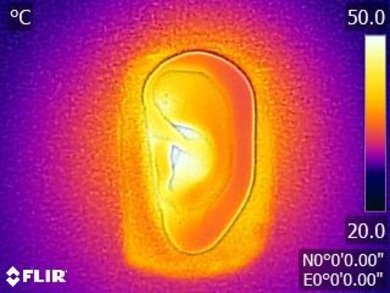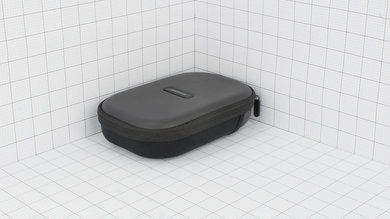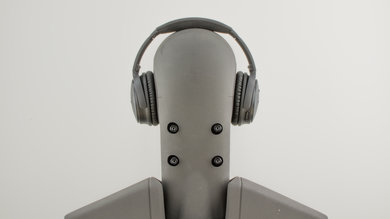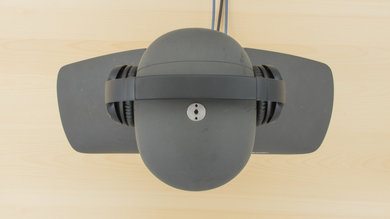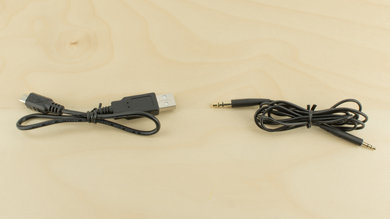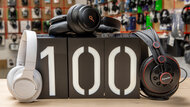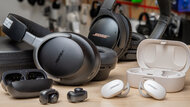Our Verdict
Above-average everyday headphones. The Bose QuietComfort 35 are versatile and offer a comfortable, well-built wireless design. They have a good sound and great noise canceling, which makes them a great option for commuters and frequent flyers. They come with a regular audio cable for more latency sensitive uses like watching a movie and gaming although they won't be ideal for those use cases especially when using Bluetooth. They're also a bit leaky.
- Outstanding noise isolation.
- Wireless and comfortable design.
- Good sound quality.
- Moderate sound leakage.
Above-average for neutral listening. They're comfortable for long listening sessions and have a good decently well-balanced sound quality. They pack a good amount of bass without drowning the instruments and vocals. However, their closed back design is not ideal for more neutral listeners due to the reduced soundstage.
The Bose QuietComfort 35 are ideal for commuting. They fare well in loud environments, busy commutes, and noisy flights, thanks to their exceptional active noise canceling. They're easy-to-use, comfortable and not too bulky.
Decent for sports use. They have a comfortable wireless design and a good control scheme. They're not too bulky but a little unstable. They also make your ears quite warm during more intense exercise due to their relatively low breathability.
Good for office use. They're super comfortable and will easily block the chatter of most office environments. Unfortunately, they also leak quite a bit at higher volumes, so the people around you may hear what you're listening to.
Below-average for gaming. They're comfortable, they have a good sound with a lot of bass and have a decent wireless range. Unfortunately, they have a mediocre-at-best integrated mic and a lot of latency which is not really suitable for gaming. They're also not compatible with consoles via Bluetooth and only have a regular audio cable with no inline microphone so you will only get audio if connect them to your Xbox One or PS4 controller.
Changelog
- Updated Nov 21, 2019: Converted to Test Bench 1.3.1.
- Updated Nov 21, 2019: Converted to Test Bench 1.3.
- Updated Feb 16, 2018: Converted to Test Bench 1.2.
- Updated Sep 28, 2017: The microphone has been tested with our new methodology, as explained here
Check Price
Popular Headphones Comparisons

The Bose QuietComfort 35 are good noise canceling headphones with a super comfortable design. They do not look as high-end for their price but provide a decently versatile design that's great for commuting and sounds decently well-balanced even without an equalizer. Unfortunately, their sound can't be customized like some of the competing models and they tend to be a bit leaky at higher volumes. See our recommendations for the best wireless over-ear headphones, the best bass headphones and the best noise cancelling headphones.
The differences between the Bose QuietComfort 35/QC35 Wireless 2016 and the Bose QuietComfort 35 II/QC35 II Wireless 2018 are minimal. The new model now has a dedicated ANC button, which you can also map for voice-enabled controls. Overall, if you always want your ANC on at max level and don’t use your device’s voice assistant, there is practically no reason to get the QC 35 II over the first model.
The Bose QuietComfort 45/QC45 Wireless have slight improvements over the Bose QuietComfort 35/QC35 Wireless 2016. While both headphones are very comfortable and well-built, the QC45 have a longer continuous battery life. They also have stronger noise isolation performance with bass-range noise, like the low rumble of bus and plane engines. Their mic's recording quality is better, too.
The Bose QuietComfort 35/QC35 Wireless 2016 and Sony WH-1000XM3 Wireless are two great pairs of noise cancelling headphones, but for different reasons. The Bose are a bit more comfortable than the Sony and have a slightly better default sound that doesn't have as much high bass, which makes them sound a tad bit more balanced overall. Their control scheme is made of physical buttons, which are easier to use. The Bose can also pair to two devices, which the Sony can't do. On the other hand, the Sony are a lot more customizable than the Bose thanks to their great app. It gives you access to a good EQ, noise cancelling options and optimization, an in-app player, room effects, and codec options. The Sony also have a longer battery life with a better quick charge feature. Overall, get the Bose if comfort is most important for you. However, if you like to tweak your audio and want more features, the Sony are the better option.
The Bose QuietComfort 35/QC35 Wireless 2016 are a slightly better wireless headset than the Sony WH-1000XM2 Wireless. They're a bit more comfortable and better balanced than the Sonys. The Bose sound quality packs a good amount of punch and still sound sufficiently detailed with instruments and vocals, thanks to their better-balanced mid and treble ranges. The Sony, on the other hand, have more control over their noise canceling feature, which can also be optimized for the environments you're in. The Sony also have a more premium-looking build quality and a better list of features, including the touch-sensitive controls and customizable sound quality.
Test Results
These headphones are a mix between the SoundLink Around-Ear II and the QuietComfort 25. They share the same wireless aesthetic and button placement of the SoundLink AE but have the premium materials of the QC25. The all-black model reviewed has a high-end yet understated appeal. However, Bose has also recently released, color customizable variations. Hence for an additional fee, you can fully alter the color schemes to suit your tastes and preferences, giving the headphones a bit more flare and personality.
The Bose QuietComfort 35 deliver a comfortable listening experience that is hard to match. They're not too tight, and the materials used for the ear cup padding is soft and molds well around your ears. However, they're a little heavier than the QuietComfort 25 due to the wireless technology and rechargeable battery, but it doesn't lessen their comfort level by much and will be barely noticeable once on your head.
The Bose QC35 have a decent control scheme. The buttons deliver great tactile feedback, and the functionalities include; Call/music, track-skipping, and volume controls. However, the controls feel a little cramped on the bottom of the right ear cup, and do not provide a noise canceling switch to just turn off the ANC or switch between ambient modes.
The Bose QuietComfort 35 do not have the most breathable design. They are over-ears that create a good seal around your ears which prevents a lot of airflow. This means they will make you sweat a bit more than average during physical exercise and will not be suitable for more intense work out routines. On the upside, they should be fine for more casual listening sessions only making your ears warm after hours of use.
The Bose QuietComfort 35 are mid-sized over-ear headphones. They're a little larger than the QuietComfort 25 but are still decently portable. They fold into a compact format, and the earcups also lay flat to take less space. Unfortunately, they're a bit too big to carry around on your person and will not comfortably fit into any pockets or smaller handbags.
The Bose QuietComfort 35 come with a sturdy, hard case that will protect the headphones from scratches, falls, and mild water damage. It also doesn't add much bulk and easily stores all the provided headphone accessories in a dedicated pocket within the case, unlike the QC25.
The Bose QuietComfort 35 are slightly better built than the similarly designed QuietComfort 25. They have a little wider headband and a more premium leather material coating. The plastic used for the ear cups is thick and should be able to handle a few drops without getting damaged. However, they have a lot of plastic in their build, which is somewhat durable but not as robust as other higher-end headphones that use dense metals for their joints and frame.
The Bose QC35, like the QC25, are stable during a casual listening session. However, they're not too tight, which makes them more comfortable but also a little less stable if used during sports. The ear cups, in particular, are slightly heavier and will sway a bit more than the QC 25. Fortunately, thanks to the wireless design, you don't have to worry about the audio cable getting caught on something and yanking the headphones off your head, which gives them a slight edge in stability over the wired model.
- Bose QuietComfort 35 headphones
- Audio cable
- Airline adapter
- Carrying case
- USB charging cable
The bass and treble delivery of the Bose QC35 is exceptionally consistent. In the bass range, the maximum deviation measured across our 5 human subjects is about 0.5dB, which is excellent. This is similar to what we have seen with the WH-1000XM2 and the QuietComfort 25. This is most likely due to the active noise cancelling (ANC) system of the headphones, which checks for fit and seal using feedback. In the treble range they are a bit less consistent, with the maximum deviation of 6dB (below 10KHz), which is still within good limits.
The Bose QuietComfort 35 have an excellent bass. Their low-frequency extension (LFE) is at 10Hz, which is great. Also, low-bass is within 2dB of our target response. This means that these headphones are capable of producing low thumping and rumbling sounds, which is important for bass-heavy genres like EDM. Mid-bass, which is important for the punch of bass and kick instruments, is also flat and within 1dB of our target. Overall, their bass is deep, well-balanced, and punchy.
The Bose QC35 have a very good mid-range. Low-mid, which is an essential region for almost all instruments, is flat and well-balanced. But mid-mid and high-mid are a bit uneven, resulting in a bit of excess intensity and projection in the higher harmonics of vocals/leads. Overall, their mid-range is clear and open, but could be slightly forward sounding are bright tracks.
The treble is great. The response is a bit uneven, but the inconsistencies are too small to have a significant effect. The only remark here is that, because of the 1.3dB overemphasis in low-treble, some may find vocals and lead instruments a tad forward on these headphones.
The imaging is very good. The weighted group delay is 0.11 which great. The group delay graph also shows that the entire response is below our audibility threshold. This is not the case with some other Bluetooth headphones such as the MDR-1000X. Additionally, the L/R drivers of our test unit were pretty well-matched. This ensures an even and coherent stereo image, which is important for localizing instruments and objects (such as voices, instruments, and footsteps) in music and video games.
The soundstage of the Bose, like most other headphones is sub-par. Their PRTF graph doesn't quite match our reference speaker's in shape (accuracy), which means that the perceived soundstage may not be quite natural sounding. However, they activate the pinna to a good degree regardless (PRTF Size), suggesting that the perceived soundstage won't be too small, like on-ears. Overall, the soundstage of these headphones is better than most on-ears and in-ears, but won't have the natural and out-of-head quality of a speaker setup.
The Bose QuietComfort 35 is one of our best-performing over-ear headphones. They achieve more than 15dB of isolation in the bass range, which is important for cancelling out the rumble of airplane and bus engines. In the mid-range they isolate by more than 22dB, which is important for cutting out human speech. In the treble range, which is occupied by sharp S and T sounds, they achieve about 35dB of isolation which is good. Unfortunately, their noise cancellation does have a bit of a suction effect which some may not like. This seems to have been fixed with the new Bose 700 Headphones.
The Bose QuietComfort 35 have an average leakage performance. Although these headphones perform slightly better than the QuietComfort 25 in the leakage test, they still leak a good amount. The majority of the leakage is between 300Hz and 3KHz, which is relatively a broad range. The level of the leakage is also relatively loud. Overall, the leakage will be audible to people around you at high volumes and in moderately quiet environments, such as a quiet office.
The performance of the Bose QuietComfort 35's integrated microphone is mediocre. Speech recorded/transmitted with the mic of the Bose will sound thin and noticeably muffled. This could make understanding the speech a bit difficult. They also don't do too well in noisy environments and will struggle to separate speech from ambient noise even in moderately loud environments, such as a busy street.
The recording quality of the Bose QC35's integrated microphone is sub-par. The LFE (low-frequency extension) of 281Hz means that speech with these headphones will sound noticeably thin. The HFE (high-frequency extension) of 2.2KHz, indicates a muffled and lacking speech transmission. This will have a negative effect on the intelligibility of speech.
The noise handling of the mic is mediocre. In our test, it achieved a speech-to-noise ratio of about 17dB, which is below average. This makes this microphone suitable mostly for quiet environments.
The Bose QC35 have a good battery life, but you still have to charge them relatively often. They're suitable headphones for long flights or road trips, and they have an adjustable timer that helps prolong the battery life. Unfortunately, you can't use them while they're charging although they do not take too long to fully charge.
The Bose Connect app is sleek but only offers a minimal list of features. It allows you to connect, rename, and update the QC35 but doesn't provide you with an equalizer. On the upside, the app provides an auto-off timer, you can set at different intervals. A limited in-app player and the battery level status but that's pretty much it, which is disappointing.
Update 18/07/2017: Firmware version 1.3.4. You can now adjust the level of noise canceling and share your music with another Bose Connect compatible headphone.
The Bose QuietComfort 35 headphones can pair simultaneously with 2 devices and support NFC. This makes them a rather versatile headphone when using Bluetooth. Like the other wireless Bose models, they have an easy to pair power switch that can be quickly toggled to put the headphones in pairing mode. They also keep the last sync devices in memory for automatic pairing when you turn the headphones on.
The Bose QC35 have about 189ms of latency. While this is about average for most Bluetooth headphones with no additional low latency codecs, it's not ideal for watching videos and gaming. If you need to watch movies either use them wired or get the Audio-Technica ATH-M50x for their wired connection and good sound.
These headphones come with a simple audio cable with no in-line remote or USB adapter. This means they do not have a mic that is compatible with consoles. The cable is also a 1/8TRS to 1/16TRS connector which is not as easily available as more standard Aux cable.
These headphones do not have a base/dock. If you want a versatile headset with a base that you can also use wired check out the Arctis 7 by SteelSeries.




